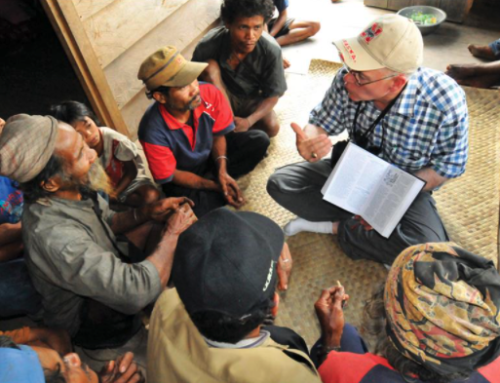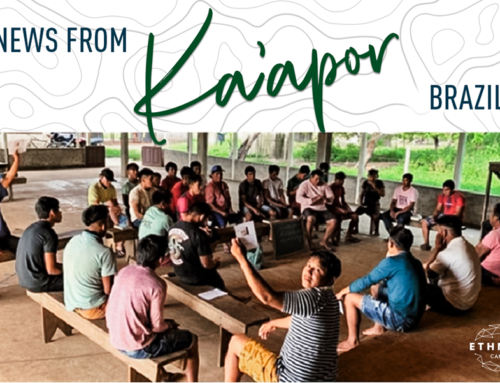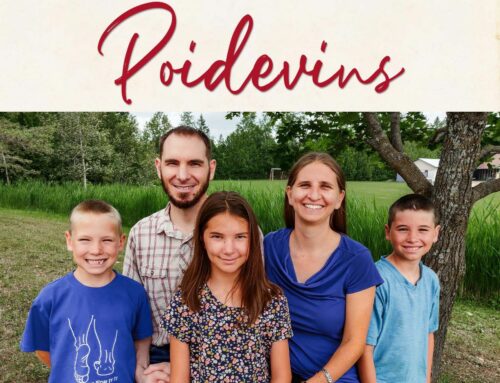Worldview differences mean the Nagi people and missionaries can observe the same thing and come away with very different conclusions.
“Then she called the name of the Lord who spoke to her, You-Are-the-God-Who-Sees; for she said, “Have I also here seen Him who sees me?” is the verse that missionary Joanna Jansma started her news update with, quoting from Genesis 16:13.
This is Hagar responding to the spirit of the Lord visiting her and speaking to her on behalf of the Lord.
These were hard circumstances for Hagar, having been used by an impatient earthly master who had little faith at the time. But even knowing that, she was able to see God, submitting to and obeying Him.
Joanna is following this great example of seeing God at work even though the circumstances she finds herself in are very difficult. She is trying very hard to see things from an eternal perspective by faith and also from the understanding that the Nagi people have in their worldview.
She wants to understand how the Nagi people see things and where that vision or perspective will be unclouded and straightened out by the truth of the Word of God one day.
Her perspective is looking forward with anticipation at how God will use her and some 40 missionaries in this area of the world to reach the unreached tribal groups with the Gospel.
Not like some of her Nagi friends who are still blinded from seeing the value of the human life that God gives breath to and His plan to use that life to bring honour and glory to Him.
It was just recently that three babies were born. One was only 28 weeks being knit together in her mother’s womb when she was born. She didn’t live very long. Was it because of the blinding deception that mothers shouldn’t feed their babies too soon after they’re born?
Yet another lady who had her baby thought maybe they should kill her since there were too many girls in the family. In the end they spared her life. Another is not wanted since the new husband has left not paying the full bride price. Will she let the little one live? Maybe she will give him away.
When a dear lady showed up for medical help with a badly beaten face needing stitches, the way others who passed by saw it was that this lady’s husband had beaten her in the wrong place. Joanna thought as she stitched her up and listened, “So, while it is comforting to know that they had some sympathy, it was ironic that people were saying that’s not how she was supposed to beaten by her husband as opposed to being clear that it’s wrong for a man to beat his wife anywhere. Just another thing I look forward to seeing a change in when there are believers; looking at wife beating with new eyes and changed hearts.”
This lack of valued perspective on human life is so common in the darkness that surrounds those in Nagiland who do not know the One who gave them life; the One who has a plan for their lives; to transform it and use it for His honour and glory.
A very physical example of the lack of being able to see things as they truly are is when Joanna showed her friend a drawing. It’s “a rat,” her friend says with confidence. It was actually a drawing of an airplane. Joanna is seeing how the lack of ability to see what’s shown on paper is directly affecting their ability to read and write.
Knowing this about their “vision” will help tremendously as she and her team strive to teach them to read and write so that they will one day enjoy and understand the Word of God and the perspective and promises it is full of for the Nagi people.
It takes training of the eye to see things on paper as they are meant to be seen. It will take this same training of the heart and mind for those who have not seen or understood the great things God in His love and grace has for them; the value that God has placed on His creation.
In the Nagi people’s minds’ eye they see that it makes sense to build their home up high, letting their perspective of spirits and sickness be what controls their behaviour and practices. When they see the truth of God’s Word it will change their whole way of dealing with this fear and all of life.
Joanna has to learn to decipher what is being said based on how her village friends are seeing and understanding. A mother’s words to her, “’Food sees, she doesn’t eat,’ sounds like bad news, but the Nagi love to not say the actual meaning. So ‘food sees, doesn’t eat’ actually means: ‘she really eats,’ so, hearing ‘she doesn’t eat’ was actually good news!”
Often the trails get so overgrown and hard to get through to see what’s in front of them. Recently, as Joanna was trying to teach reading and writing, the people “traded in pencil holding for machete swinging and worked as a community on clearing trails.” They do this in order to help everyone see clearly as they work their way through the jungle.
There are obviously so many “weeds” and “overgrown trails” that have to be worked through and chopped away little by little in order for the Nagi people to clearly see their way through to the Truth of God’s Word that will free them from seeing things in a distorted way.
The missionary team says, “This means we continue to research terminology. How can we best describe God’s character in the Nagi language? How to say God is everywhere at the same time? He is three persons but one God? The word angel in a few words instead of a paragraph? This is all part of making sure what is being communicated is true. We are thankful for the terms that are being understood well.”
It’s exciting for the missionaries when they see those who are hearing the truth really see God for Who He is. Joanna’s missionary co-worker Porter Hampton says that, “As we talked about the punishments that God put on Adam and Eve for their rebellion, Yan and Anton had no trouble seeing that they also partake of those curses because they are descendants of Adam and Eve.”
This new perspective is cultivating ground to build the view of a gracious God who has sent a Deliverer ready to be “the man who will reconnect the road to God.” It fits well with previous terminology that communicates Adam and Eve’s separation from God, is seen as ‘they cut off their road.’”
This can motivate us to pray for eyes to be opened among the Nagis to the spiritual truths that, when seen clearly, will change their lives forever.






